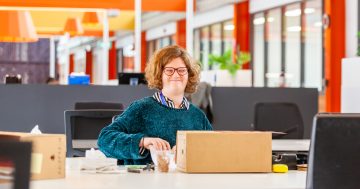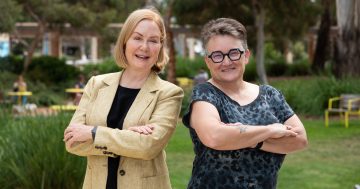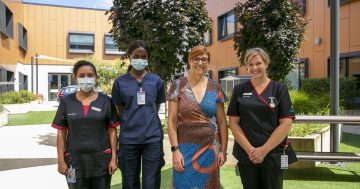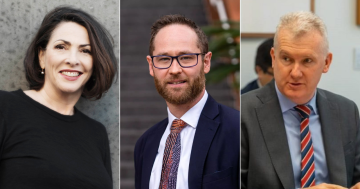
Wanniassa High special education students learned a variety of skills on work experience. Photos: Supplied.
A local school that’s engaged with their local community and local businesses is developing huge benefits for Canberra kids living with an intellectual disability.
Wanniassa Schoiol senior campus, Koomarri disability services, some generous community donors and several small local businesses collaborated this year on a career discovery project that’s given these students skills training, work experience and life experience that could transform their futures.
And there were beaming faces all round as students received their graduation certificates and heard feedback about their efficiency, usefulness, good cheer and value in the workplace. All employers agreed to be referees for their student and most said they would also be willing to employ the students in the future if an opportunity arose.
That’s vitally important, as Koomarri CEO Nadine Stephen explains. “The earlier you get in, the better your chance to support people with mainstream employment. The evidence shows that if people with a significant intellectual disability are not exposed to mainstream employment opportunities by the age of 21, it’s unlikely they will ever get and maintain a job.

Students worked in retail, hospitality and maintenance during a ten-week course.
“We approached Wanniassa High because they are leaders in the local community for delivering really good educational outcomes and they have a strong inclusive model for students with an intellectual disability,” Nadine says, adding that the focus on placement with small local businesses was also a key part of the model.
“The workplaces gain too because they learn about disability and then they become advocates and employers. The rest of us take this stuff for granted. It’s a rite of passage that you do work experience and get your first job, but people with an intellectual disability mostly don’t experience that.”
Students are part of a mainstream inclusion programme and are withdrawn for a variety of skills classes. A key part of this initiative, for example, was the generous donation of laptops that enables the students to work with interactive technology. They’re also taught community access skills including how to manage money and workplace expectations, along with a whole range of everyday issues that help them to gain a positive, resilient mindset.
The partnership with Koomarri helps to match the students with work experience opportunities, meeting individual student needs by matching them to the right local business and the Centre for Disability Employment Research and Practice has also been part of the project. The headstart on skills is also an urgent need, given that currently only 2 per cent of NDIS recipients over 25 and 5.2 per cent of those between 15 and 24 have employment funding in their plans.
“We know the outcomes for the students’ lives will be the same for everyone if they can access meaningful employment,” Ms Stephen says. “Economic participation is personally meaningful and socially valued. It has such an impact across your life, your sense of belonging, of making money and having a role. Having a job forms people’s identity.”

Work satisfaction, as well as future employment opportunities, are an outcome of the programme.
And there’s ample evidence of that in the room: one student who hadn’t wanted to even participate ended up manning the till at the front of the shop by the end of the ten-week programme. Others mowed lawns, helped to repair cars, prepared and served food, learning a wide variety of work and life skills in the process.
As one of their teachers says proudly, “These students are my favourites in the whole school because they work so well, they’re always ready to learn, they all keep trying and trying to the best of their ability. They say it takes a village to raise a child, and that’s what the vision of the school is about, many professionals working together to give them a future”.
















